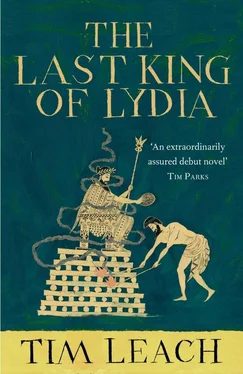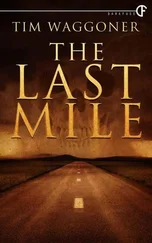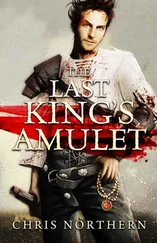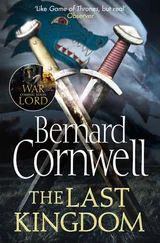Tim Leach - The Last King of Lydia
Здесь есть возможность читать онлайн «Tim Leach - The Last King of Lydia» весь текст электронной книги совершенно бесплатно (целиком полную версию без сокращений). В некоторых случаях можно слушать аудио, скачать через торрент в формате fb2 и присутствует краткое содержание. Год выпуска: 2013, ISBN: 2013, Издательство: Atlantic Books Ltd, Жанр: Исторические приключения, на английском языке. Описание произведения, (предисловие) а так же отзывы посетителей доступны на портале библиотеки ЛибКат.
- Название:The Last King of Lydia
- Автор:
- Издательство:Atlantic Books Ltd
- Жанр:
- Год:2013
- ISBN:9780857899200
- Рейтинг книги:5 / 5. Голосов: 1
-
Избранное:Добавить в избранное
- Отзывы:
-
Ваша оценка:
- 100
- 1
- 2
- 3
- 4
- 5
The Last King of Lydia: краткое содержание, описание и аннотация
Предлагаем к чтению аннотацию, описание, краткое содержание или предисловие (зависит от того, что написал сам автор книги «The Last King of Lydia»). Если вы не нашли необходимую информацию о книге — напишите в комментариях, мы постараемся отыскать её.
The Last King of Lydia — читать онлайн бесплатно полную книгу (весь текст) целиком
Ниже представлен текст книги, разбитый по страницам. Система сохранения места последней прочитанной страницы, позволяет с удобством читать онлайн бесплатно книгу «The Last King of Lydia», без необходимости каждый раз заново искать на чём Вы остановились. Поставьте закладку, и сможете в любой момент перейти на страницу, на которой закончили чтение.
Интервал:
Закладка:
Cyrus had expected much from Croesus’s bedchamber, the private sanctuary of a man who had almost made a religion of his wealth. Here, where no one else could see them, Cyrus had imagined that Croesus would keep his most beautiful artefacts, but there was something half-hearted about the priceless ornaments that decorated the room, as though they had been placed out of obligation, rather than true desire.
The morning of the execution, Cyrus rose long before dawn. The servants who came hesitantly to wake him found him waiting for them, fully dressed and reading by torchlight to pass the time. He accompanied them down staircases that had been scrubbed clean of blood just hours before. At the same moment, somewhere far below, he knew that Croesus was being woken and led to the place of his death.
Cyrus reached the entrance to the atrium in good time, and waited for the sun to rise. One by one, his advisors appeared and came to wait with him, their faces long with exhaustion. Cyraxes looked especially tired; grey faced and stooped. Cyrus leaned forward and clapped his hands by the old man’s right ear. Cyraxes jumped in surprise, and the other men laughed, grateful for the break in tension, before they lapsed back into silence.
The moment came at last, and Cyrus pushed open the double doors, and entered with the sun.
He looked at the pyre, the wood heaped at its base, the high stake and wooden throne, the pale figure tied to it with a single iron chain. A wooden colossus, built to consume itself. He glanced at Croesus for only a moment before he sat down at the table.
He waited for his taster to sample the food, but when he was at last allowed to eat, he ate lightly — a few pieces of bread, some dates and olives. He took a single sip of wine and gazed at the prisoner on the pyre.
Cyrus had looked into the eyes of many condemned men. Kings he had conquered, traitors he had executed, criminals on whom he had been asked to give final judgement. He knew that all of them, as they met his gaze, believed that they were showing him something unique. They were not. There were only a few ways for a man to meet his death, and Cyrus had seen them all many times over. In Croesus’s eyes, the king saw something familiar. Acceptance.
Cyrus leaned back in his chair, and gestured to the servants around the pyre. He beckoned to another man on the balcony to bring him his parchments. He heard but did not see the fire being lit, and at the same moment acrid incense filled his nostrils. Cyrus sniffed in distaste, and bent over the table to busy himself in the affairs of state.
Some of the messages he reviewed had travelled merely hours to reach him. Questions about supplying the army that now occupied Sardis, or the appointments of new local rulers for the conquered towns and cities of the Lydian empire. Others were messages from the far side of his kingdom, which had taken weeks to arrive over mountains and seas, passing through a dozen hands before they reached the attention of the king.
For these delayed messages, he gave commands in response to events that had yet to occur: on receiving news of a food shortage in Ecbatana, he sent an order to put down the riot that he knew would have broken out by the time the message arrived in the east; learning that a fleet of merchant vessels was a day late in reaching Suhar, he sent his scouts to scour the coast for the shipwreck he was certain had occurred. Ruling the future, Cyrus was fond of saying, was the last great skill for a king to master.
He had dispatched only a few messages when he heard a low groan from the pyre. Cyrus looked up in surprise; perhaps wood burned quicker in the west, he thought. But the fire had not yet reached the prisoner. Cyrus saw Croesus’s lips move twice, but he spoke too softly for the Persian king to hear. Then he said the same word a third time, just loud enough to be audible.
‘Solon.’
Cyrus frowned. ‘What does that mean?’ he said to his interpreter.
‘I do not know.’
‘Ask him.’
‘My lord?’
Cyrus nodded towards the pyre. The interpreter bowed, and asked the question in Lydian.
Croesus raised his head and looked at Cyrus. ‘He is a man all kings should speak to,’ the prisoner said, his eyes streaming from the smoke.
‘Oh?’ Cyrus said, after the interpreter relayed this to him. ‘And why is that?’
‘He taught me that the Gods hate the fortunate,’ Croesus shouted over the rising roar of the fire, ‘and that I would die unhappy!’
Cyrus watched as Croesus threw his head back against the stake and bared his teeth. The fire had yet to touch him, but it would not be long before some straying lick of flame touched off the oil on his robe. The smoke grew heavier and hid Croesus from view. Occasionally, Cyrus still caught a glimpse of movement through the thickening air, as Croesus writhed against the stake. Cyrus sat, his chin resting against the palm of his hand, and listened to the hoarse screams of the dying king.
Cyrus had sat through many executions. Some swift, most slow. He knew the worst was about to come, the point at which the condemned man was beyond all chance of reprieve, was certain to die but not yet dead. It was a terrible thing, to watch a man in those last moments, when there truly was no hope.
‘Put it out,’ he said.
Six men stepped forward, pouring sand and water. The fire, which had seemed so powerful and irresistible, was extinguished in a matter of moments. The guards came forward to free the prisoner, but were driven back by the heat of the embers. They waited, their cloaks wrapped across their faces.
Eventually, one of the soldiers leaned forward and poked at the ashes with the shaft of his spear. Seeing the embers fade to red and grey, he stepped carefully over the pyre, the half-burned logs breaking underfoot. Seeing Croesus slumped forward, he raised the prisoner’s head and rolled open his eyes. The soldier nodded, as if in satisfaction, and unlocked the chain that held Croesus to the stake.
Croesus cried out as his weight came down on his feet, and curled up against the wooden chair. He looked up at the soldier who had freed him. ‘I can’t walk,’ he said. The guard frowned. Irritably, Croesus jabbed at his feet with a finger. The soldier nodded in understanding, and, passing his spear to one of his companions, he knelt and picked Croesus up, one arm under the crook of his legs, the other around his back. The Lydian closed his eyes against the shame of it, and put his arms around the Persian’s neck, letting himself be carried down and placed on the cold ground.
Cyrus walked down the stairs and across the courtyard towards his defeated enemy. His pace was unhurried, like a man taking an idle stroll at dusk to enjoy the last of the daylight. He stood over Croesus for a time, his entourage of advisors, slaves and bodyguards gathered behind him. The two kings looked at each other in silence.
‘So,’ Cyrus eventually said, in gently accented Lydian, ‘tell me about Solon.’
Croesus stared at Cyrus and then at his interpreter. Then he shook his head. ‘Why?’
‘Because I am curious.’ Cyrus glanced at the pyre, still pouring smoke into the air. ‘When they first lit the pyre, you had the face of a man hurrying towards death. When you said that name, it seemed to me that you changed your mind.’
Croesus looked at the ground. He spoke slowly. ‘He was an Athenian who came to my court. I had been on the throne a year. I had my wealth, and my family. So I asked him if I was the happiest man he had ever met.’
‘And?’
‘He said no one was happy until they were dead. Until then, you are just lucky. He claimed that it was only when he had seen a man’s entire life, and the way he met his death, that he could say whether or not that man had lived a happy life.’ Croesus shrugged. ‘I thought he was a fool.’
Читать дальшеИнтервал:
Закладка:
Похожие книги на «The Last King of Lydia»
Представляем Вашему вниманию похожие книги на «The Last King of Lydia» списком для выбора. Мы отобрали схожую по названию и смыслу литературу в надежде предоставить читателям больше вариантов отыскать новые, интересные, ещё непрочитанные произведения.
Обсуждение, отзывы о книге «The Last King of Lydia» и просто собственные мнения читателей. Оставьте ваши комментарии, напишите, что Вы думаете о произведении, его смысле или главных героях. Укажите что конкретно понравилось, а что нет, и почему Вы так считаете.












